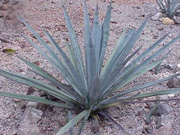AGAVE
Along with the overall taste, a product’s sweetness is one of its most important characteristics. Historically, sucrose (regular white sugar) has been the primary sweetener in processed products. However, with an increased consciousness about the health effects of refined sugar and empty calories, coupled with the controversial nature of artificial sweeteners, the search for other sweeteners has been intense. One solution is agave.

Agave, also called agave nectar or agave syrup, is a relatively new natural sweetener produced from the Agave cactus plant. Agave offers a number of attractive features. It is a sweetener that is sweeter than sugar, but has a lower glycemic impact. Agave is also sweeter than honey, another natural sweetener. Agave comes in a wide variety of subtle pleasant flavors and colors. Agave nectar has found use as a tabletop sweetener and in beverages such as sports drinks. Although being of roughly equal caloric value as sucrose, since agave is sweeter it provides the same sweetness with fewer calories, making it an attractive sugar alternative in many settings.
Nutrient Profile
Agave consists primarily of fructose and glucose, but has a higher fructose content than sucrose. Its fructose concentration ranges between 60-90%. While having a fructose content similar to high fructose corn syrup, the fructose in agave is in its natural form (unlike high fructose corn syrup which is produced in a complex multistep industrial process by which starch is extracted from corn and converted with acids or enzymes into glucose and fructose).
Due to its high fructose content, agave is notable as its glycemic index is lower than most, if not all other natural sweeteners on the market. Agave’s low glycemic impact eliminates the sucrose induced blood sugar roller-coaster effect. In contrast to sucrose and artificial sweeteners, agave also contains minerals like potassium, magnesium, iron and calcium. In addition, agave is a good source of inulin, which is a naturally occurring dietary fiber that is healthy for your digestive system.
Uses
Agave is suitable to substitute for sugar in recipes. Use 1/3 cup of agave syrup for every 1 cup of sugar in the original recipe. Since agave is fluid, the quantity of liquids in the original recipe must be reduced due to the moisture included in the syrup. Some chefs also reduce the oven temperature by 25°F in recipes requiring baking. Agave makes baked goods come out moist and smooth.
Agave is also a very effective sweetener for cold beverages, such as smoothies, lemonades and iced tea. Agave, unlike regular sugar and honey, dissolves readily in cold liquids.
Remember that agave is sweeter than sugar, so you need less of it, 1/3 cup agave for every 1 cup of regular sugar. Thereby get to enjoy the pleasant natural sweetness without all of the calories!